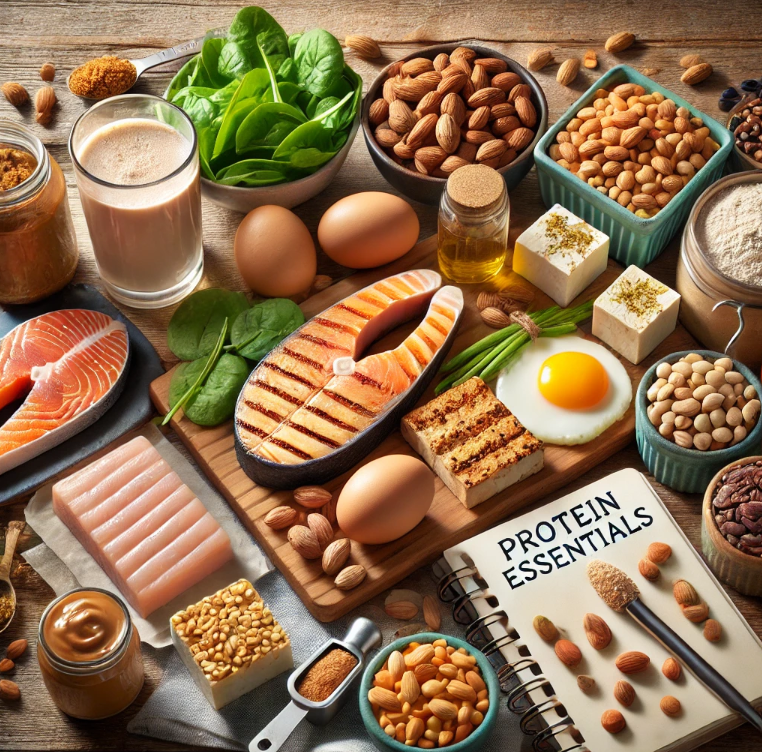Protein is one of the most vital macronutrients in the human diet, playing a central role in various physiological processes. Often referred to as the building block of life, protein is crucial for maintaining health and wellness. In this blog, we will discuss the “importance of protein in the body,” its benefits, and why it should be a significant part of your daily diet.
1. Building and Repairing Tissues
Protein is essential for the growth and repair of tissues in the body. Whether it’s muscle recovery after exercise, wound healing, or replacing damaged cells, protein plays a pivotal role. This is why athletes and individuals recovering from injuries often increase their protein intake.
Function of protein in the body:
- Provides structural support to tissues.
- Repairs and regenerates muscle fibers after workouts.
2. Supports Muscle Growth and Maintenance
Muscles are primarily made up of protein. Consuming adequate amounts of protein helps preserve muscle mass, especially during weight loss or aging.
Why is protein important for weight loss? It aids in preserving lean muscle while promoting fat loss, making it a key component in weight management.
3. Regulates Hormones and Enzymes
Proteins serve as precursors for hormones and enzymes that regulate bodily functions. For example:
- Insulin: Helps control blood sugar levels.
- Enzymes: Aid in digestion and metabolic reactions.
4. Boosts Metabolism
High-protein diets are known to enhance metabolic rate. The body requires more energy to digest and metabolize protein compared to fats or carbohydrates, contributing to weight loss.
How eating more protein changed my body: It helped reduce hunger, maintain lean muscle mass, and improve metabolism.
5. Strengthens Immunity
Proteins form antibodies that combat infections and illnesses, ensuring a robust immune system. A deficiency in protein can weaken immunity, leaving the body susceptible to diseases.
6. Promotes Healthy Hair, Skin, and Nails
Keratin, a type of protein, is the primary structural component of hair, skin, and nails. Consuming sufficient protein ensures that these parts of the body remain strong and healthy.
7. Aids in Weight Management
Why is protein important for weight loss? Protein keeps you fuller for longer by reducing appetite and lowering overall calorie intake. Additionally, it helps maintain energy levels throughout the day.
8. Balances Fluid Levels
Proteins like albumin and globulin maintain fluid balance in the body, preventing conditions such as edema (swelling caused by fluid retention).
9. Improves Bone Health
Protein contributes to bone density and reduces the risk of fractures. Pairing protein-rich foods with calcium enhances bone health significantly.
10. Supports Cellular Functions
Proteins are involved in almost every cellular process, from cell signaling to transporting nutrients and oxygen throughout the body. This underscores the “8 functions of proteins” that are vital for survival.

Top Protein Foods
Including a variety of protein sources in your diet ensures balanced nutrition. Here is a table showcasing “top 10 protein foods”:
| Food Item | Protein Content (per 100g) | Calories |
|---|---|---|
| Chicken Breast | 31g | 165 |
| Eggs | 13g | 155 |
| Greek Yogurt | 10g | 59 |
| Lentils | 9g | 116 |
| Almonds | 21g | 579 |
| Cottage Cheese | 11g | 98 |
| Salmon | 25g | 208 |
| Quinoa | 4.4g | 120 |
| Tofu | 8g | 76 |
| Peanut Butter | 25g | 588 |
Protein Advantages and Disadvantages
While protein has numerous advantages, it’s essential to consume it in moderation:
Advantages:
- Supports muscle repair and growth.
- Enhances metabolism.
- Promotes satiety, aiding in weight management.
Disadvantages:
- Excess protein can strain the kidneys, especially in individuals with pre-existing kidney conditions.
- May lead to dehydration if water intake isn’t sufficient.
FAQs
Q1: What is the importance of protein in the body? Protein is essential for tissue repair, hormone regulation, immune function, and muscle maintenance.
Q2: What are the 12 benefits of protein? Some key benefits include muscle growth, enhanced metabolism, improved immunity, better bone health, and weight management.
Q3: Why is protein important for weight loss? Protein reduces appetite, increases satiety, and preserves lean muscle during weight loss.
Q4: What are the protein advantages and disadvantages? Advantages include improved muscle health and metabolism, while disadvantages involve potential kidney strain from excessive intake.
Q5: What are the top 10 protein foods? Foods like chicken, eggs, lentils, almonds, and salmon are among the best protein sources.
Q6: What is the function of protein in the body? Proteins build tissues, regulate enzymes and hormones, and support cellular processes.
Q7: How does eating more protein change the body? Increased protein intake promotes muscle growth, enhances metabolism, and supports overall health.
Q8: What are the 8 functions of proteins? They include structural support, immune defense, hormone regulation, enzyme activity, nutrient transport, fluid balance, energy provision, and cellular repair.

